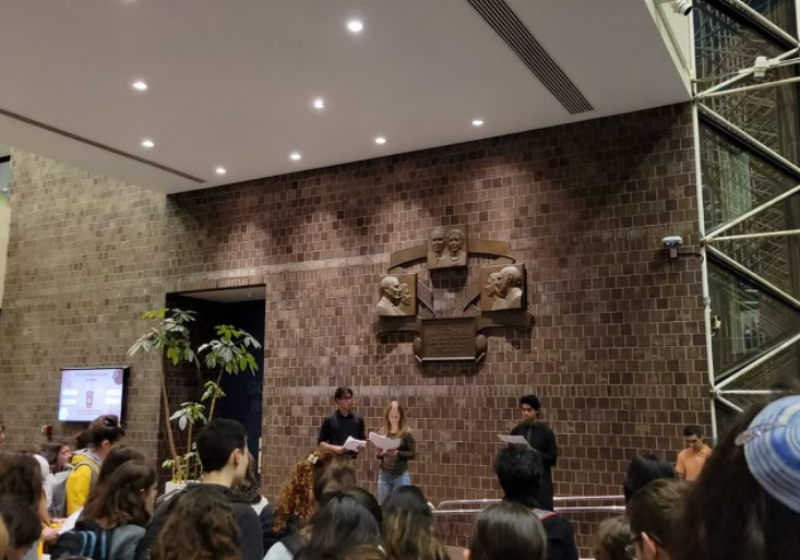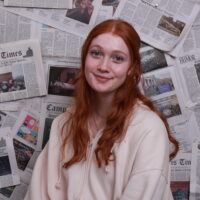Rows of candles lined Hirst Lounge Dec. 10 as students and faculty gathered for a vigil and watched junior Moez Boussarsar deliver his original piece on the coexistence of Jewish individuals and Muslims in Tunisia — the community he grew up in.
The vigil, organized by sophomores Ilana Weiss and Mucteba Gokcek and advised by Political Science professor Gerald Gamm, brought members of the UR community together to establish peace and mourn the deaths of civilians in the ongoing Israeli-Palestinian conflict.
“It was hopefully a place where all students could share a common interest in ending violence, regardless of their viewpoint or where they stand,” Eisenberg said.
The vigil featured student speakers who recited various passages written by individuals of Israeli, Jewish, Arab, or Palestinian backgrounds. Audience members followed along with pamphlets, which included all of the excerpts.
While the vigil pamphlet primarily included contributions from already-written passages, Boussarsar said he believed no existing piece would add as much value as an excerpt he could write himself. His original work, titled “The More I Grow, the More I Know,” reflects on his upbringing and experiences as a Muslim student in Tunisia who grew up near a small Jewish community.
99% of Tunisia is Muslim, and the other 1% is mostly Jewish with a mix of other religions, Boussarsar said. Jewish individuals thus comprise the second-largest religious community in Tunisia, with the majority living on an island called Djerba. There are three or four Jewish neighborhoods on the island.
Boussarsar added that if Tunisian individuals do not take the time to visit the island where the Jewish community lives, they will likely not have many opportunities to learn about the community. He was able to consistently travel growing up, and visited the island multiple times. Boussarsar said he enjoyed his encounters in Djerba because Tunisia is noticeably homogenous, so the island was an unfamiliar, eye-opening experience.
“There are many individuals from the Jewish community that had a lot of influence on Tunisian culture, specifically the food and the art. People don’t know about this community — even people from Tunisia,” Boussarsar said. “I wrote about how some Tunisians might not feel that they owe anything to the Jewish community, but they should. In the same way, the Jewish community owes to the people around them setting the ground for all communities to coexist.”
Boussarsar concluded his piece addressing the Jewish community in Tunisia as follows: “I feel ashamed when I hear my own speaking bad of you. And for that, I will stand with you, present or absent.”
The excerpt speaks to the ultimate goal of the vigil — to create a space for coexistence and togetherness in the midst of a whirlpool of conflicting viewpoints, thoughts, and sentiments.
Boussarsar said he usually prefers to partake in other types of demonstrations on campus, like protests. Although he believes that protests tend to be more radical in nature and do not always make room for individuals with less extreme or polarized viewpoints, he still believes that “Historically these demonstrations are what change things.”
He went on to say, “My father used to always tell me that in this society, there are always 20% of people who are convinced of a certain concept or topic, 20% who are convinced against that topic, and then the 60% in the middle.”
In order to reach the “60%” in the middle, Boussarsar said it is important to organize events like the vigil. “The goal is to be neutral and for the event to be accessible — not accessible in terms of place or time, accessible in that people don’t feel like they are supporting one side or the other by attending said event,” he added.
According to Eisenberg and Gokcek, both organizers were very pleased by the turnout of the vigil, with over 250 people in attendance.
“I’m really glad that people in the UR community were able to get behind this idea of peace and coming together,” said Gokcek. “We appreciated that people took the time out of their days to stand with each other and stand next to each other during such a critical time.”
Gokcek added that the vigil was only one event to hopefully begin a cascade of additional events this spring.
“A lot of off-campus organizations reached out to us saying that they wanted to fund our future programs,” she said. “They want to help us bring in more speakers to the university to help spread more ideas of peace.”
Editor’s Note: This article was corrected on Feb. 10, 2024. The name of one of the vigil’s organizers was erroneously written as Alana Eisenberg, when the correct name is Ilana Weiss.



